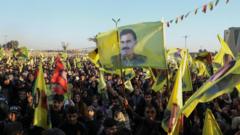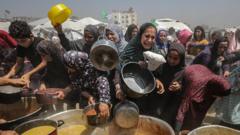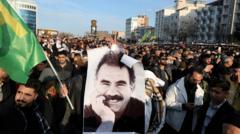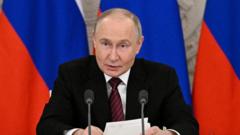The decision of the PKK to cease hostilities against Turkey has elicited varied responses from the Kurdish community, with some expressing skepticism about government assurances, while others urge for the release of imprisoned leaders to pave the way for genuine peace.
Historic PKK Disbandment Sparks Mixed Reactions Among Kurdish Community

Historic PKK Disbandment Sparks Mixed Reactions Among Kurdish Community
As the PKK answers calls for disarmament after decades of conflict, there's both skepticism and cautious hope among Kurds regarding the future of peace in Turkey.
The Kurdistan Workers Party (PKK) has announced its decision to disband, marking a pivotal moment after four decades of conflict that has claimed around 40,000 lives and seen the Kurdish aspirations for autonomy largely unrealized. This decision comes after a call from PKK leader Abdullah Ocalan, who, despite being imprisoned since 1999, continues to hold significant influence among Kurdish supporters.
The Turkish government has welcomed this historic step, with a spokesperson for President Recep Tayyip Erdogan describing it as crucial for a nation aspiring to be free of terror. However, skepticism remains among many Kurds about what this disarmament entails for their rights and future. For instance, Necmettin Bilmez, a 65-year-old local driver, expressed doubt over government intents, feeling that unless there are tangible acknowledgments of Kurdish identity and rights, the promises for peace will ring hollow.
Others, like 80-year-old Mehmet Ek, voiced hopes that this move could finally bring an end to the bloodshed that has stained both Kurdish and Turkish lives. He called for amnesty for PKK fighters and the release of political prisoners to truly pave the way for lasting peace. The general sentiment in the predominantly Kurdish city of Diyarbakir reflects a yearning for an end to violence, highlighting that many locals simply want peace, free from further loss of life.
The ongoing conflict extends beyond Turkey's borders, affecting the stability and security of neighboring regions. Calls for the release of Ocalan continue to resonate within the community, with many believing his freedom is intertwined with their quest for peace. Menice, a mother who lost multiple family members to the violence, conveyed the depth of this sentiment, asserting that true freedom for Kurds can only come with Ocalan's liberation.
As both the PKK and Turkish authorities assess their positions, various influences including the upcoming electoral landscape in Turkey are likely to shape negotiations moving forward. Amidst both skepticism and hope, the disbandment signals a potential turning point, offering a glimmer of possibility for future dialogue and resolution in one of the world's longest-running conflicts.
The Turkish government has welcomed this historic step, with a spokesperson for President Recep Tayyip Erdogan describing it as crucial for a nation aspiring to be free of terror. However, skepticism remains among many Kurds about what this disarmament entails for their rights and future. For instance, Necmettin Bilmez, a 65-year-old local driver, expressed doubt over government intents, feeling that unless there are tangible acknowledgments of Kurdish identity and rights, the promises for peace will ring hollow.
Others, like 80-year-old Mehmet Ek, voiced hopes that this move could finally bring an end to the bloodshed that has stained both Kurdish and Turkish lives. He called for amnesty for PKK fighters and the release of political prisoners to truly pave the way for lasting peace. The general sentiment in the predominantly Kurdish city of Diyarbakir reflects a yearning for an end to violence, highlighting that many locals simply want peace, free from further loss of life.
The ongoing conflict extends beyond Turkey's borders, affecting the stability and security of neighboring regions. Calls for the release of Ocalan continue to resonate within the community, with many believing his freedom is intertwined with their quest for peace. Menice, a mother who lost multiple family members to the violence, conveyed the depth of this sentiment, asserting that true freedom for Kurds can only come with Ocalan's liberation.
As both the PKK and Turkish authorities assess their positions, various influences including the upcoming electoral landscape in Turkey are likely to shape negotiations moving forward. Amidst both skepticism and hope, the disbandment signals a potential turning point, offering a glimmer of possibility for future dialogue and resolution in one of the world's longest-running conflicts.




















